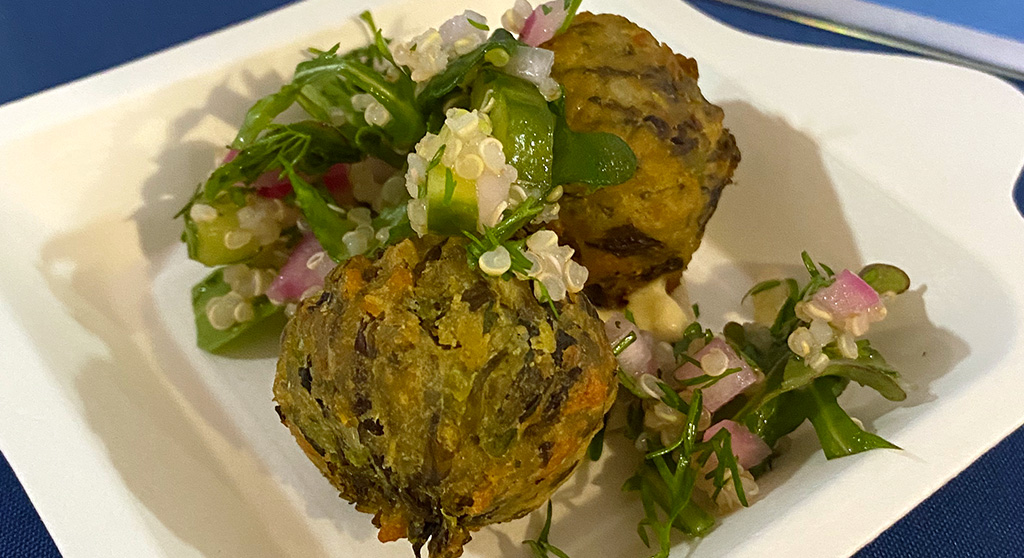‘Sea-weedish meatballs’ join the menu at CRLS with the kelp of student-led Project GreenPlate

Kelp veggie bites, made with Maine kelp, are served at Cambridge Rindge and Latin School. (Photo: Cambridge Public Schools)
Imagine walking the Maine shoreline on a fine summer day, glancing down at a tangle of semitransparent seaweed and thinking it would be your dinner. Most New Englanders would not call it appetizing.
That’s the perception that members of Project GreenPlate, a student organization at the Cambridge Rindge and Latin School, are trying to change – one vegan, gluten-free, kelp-based “Seaweedish meatball” at a time. The kelp veggie bites, served with quinoa and greens, have become a regular offering on CRLS’ student menu.
Sugar kelp is the featured ingredient in the dish developed by Andrew Wilkinson, the K-12 and higher education chef at North Coast Seafood, which worked with Project GreenPlate to test the food at the high school.
Nicolas Valayannopoulos-Akrivou, co-founder of Project GreenPlate with his sister Luna-Nefeli, described the rollout over the spring: “We started out with just this little table here where people got samples, and slowly we got overwhelmingly good feedback. We decided to make the leap to make the menu as it is today.”

A kelp taste test held May 25 at Cambridge Rindge and Latin School with, from left, Simon Ready-Miller, Jing O’Neil and Nicolas Valayannopoulos-Akrivou. (Photo: Bethany Versoy)
“People like that it’s not trying to be fake meat,” Valayannopoulos-Akrivou said. “It’s not made out of these chemically synthesized materials that try to replicate the texture or the taste that meat has in your mouth. It has its own taste and flavor.”
Students started holding pop-ups featuring kelp-based entrees in February, providing samples to encourage students to try them.
The veggie bites are now on the permanent menu, rotating in on a monthly basis, and the group is working with school staff to make it a weekly option in September.

A kelp veggie bites serving at CRLS. (Photo: Bethany Versoy)
Members don’t want to replace meat, but to encourage people to try alternatives and think about substituting non-meat options in meals that are meat-intensive.
Wilkinson thinks of sugar kelp as a vegetable “superfood,” noting that is nutrient dense and has more calcium per ounce than milk. It is also high in antioxidants.
Mellissa Honeywood, the school district’s food and nutrition services director, began working with Wilkinson in late 2022 to develop menu items that would appeal to students and would be easy to use in a busy kitchen. The kelp veggie bites can be served with pasta, as a salad topper and are available in a slider size for mini burgers.
Kelp in the classroom
Sugar kelp, used in Japanese dishes including miso soup and udon, is farmed offshore in New England and gaining attention rapidly for its culinary possibilities in non-Asian dishes, as well as its economic and environmental benefits as the area’s climate changes.
The gulf of Maine is the fastest-warming body of water in the world. Young lobsters can’t survive in warmer water, and disease and predation in the changing climate affects adult lobsters, according to a 2018 Gulf of Maine Research Institute study. As lobsters’ habitat moves northward along the Canadian coast, fishers relying on them and other species for their livelihood are looking for other ways to make a living from the sea.
Jing O’Neil, a senior and Project GreenPlate member, said three CRLS teachers are interested in adding kelp farming to their lesson plans in environmental science, Advanced Placement biology and marine biology classes, reaching roughly 120 students.
Members hope to produce a video or a presentation about the environmental, social and economic impact of kelp farming to present to the classes.
“You have the economic and social effects, the diversified jobs and the environmental impacts by not investing in an industry that is carbon- and water-intensive, and on top of that kelp itself is a carbon safe,” said member Simon Ready-Miller, a sophomore, referring to kelp’s ability to absorb carbon dioxide and produce oxygen during photosynthesis.
Project GreenPlate’s start
Project GreenPlate began in 2020 with the Glocal Challenge, an initiative lead by EF Education First, the City of Cambridge and Cambridge Public Schools that challenges students to solve a local problem that could become a global solution.
That year the question posed was “Water Water Everywhere, and Not a Drop to Waste,” with the key question being how water could be conserved in Cambridge.
“We investigated and discovered that the biggest water consumption goes to the meat industry to grow cattle,” Valayannopoulos-Akrivou said. The slaughtering process goes on to pollute water as well.
Project GreenPlate applied for and received a grant that has funded several initiatives, including introducing kelp to the CRLS menu.
O’Neil said that people outside the school have asked where they can find and try the kelp bites. She hoped local shops such as Broadway Market and Harvard Market will consider stocking kelp-based products. Meantime the kelp bites and a salmon-kelp ocean burger are available frozen through North Coast Seafood.



Meat alternatives in school lunches are essential! It’s too bad that even though they are often listed in the monthly menu, they’re frequently unavailable at the cafeterias of certain schools and if they are available, are only upon special request.